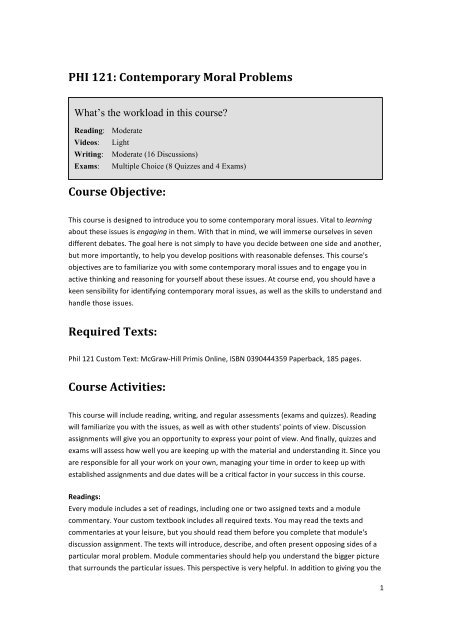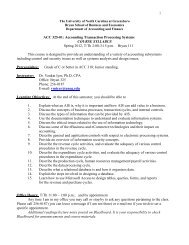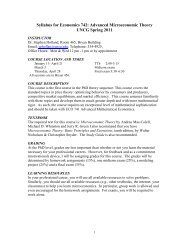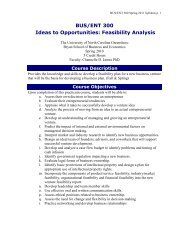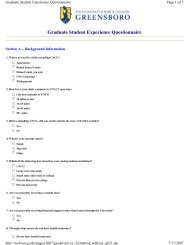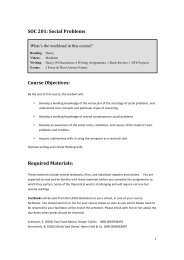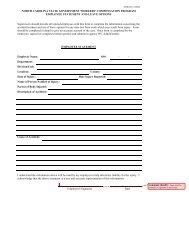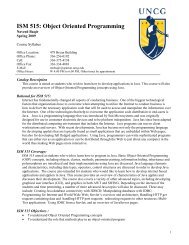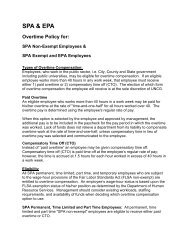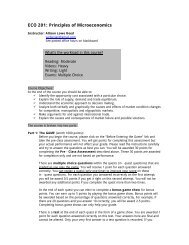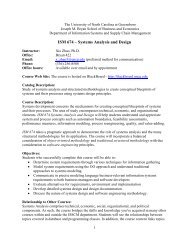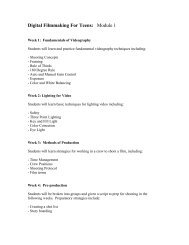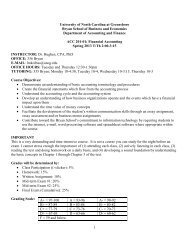PHI 121: Contemporary Moral Problems Course Objective: Required ...
PHI 121: Contemporary Moral Problems Course Objective: Required ...
PHI 121: Contemporary Moral Problems Course Objective: Required ...
Create successful ePaper yourself
Turn your PDF publications into a flip-book with our unique Google optimized e-Paper software.
<strong>PHI</strong> <strong>121</strong>: <strong>Contemporary</strong> <strong>Moral</strong> <strong>Problems</strong><br />
What’s the workload in this course?<br />
Reading: Moderate<br />
Videos: Light<br />
Writing: Moderate (16 Discussions)<br />
Exams: Multiple Choice (8 Quizzes and 4 Exams)<br />
<strong>Course</strong> <strong>Objective</strong>:<br />
This course is designed to introduce you to some contemporary moral issues. Vital to learning<br />
about these issues is engaging in them. With that in mind, we will immerse ourselves in seven<br />
different debates. The goal here is not simply to have you decide between one side and another,<br />
but more importantly, to help you develop positions with reasonable defenses. This course's<br />
objectives are to familiarize you with some contemporary moral issues and to engage you in<br />
active thinking and reasoning for yourself about these issues. At course end, you should have a<br />
keen sensibility for identifying contemporary moral issues, as well as the skills to understand and<br />
handle those issues.<br />
<strong>Required</strong> Texts:<br />
Phil <strong>121</strong> Custom Text: McGraw‐Hill Primis Online, ISBN 0390444359 Paperback, 185 pages.<br />
<strong>Course</strong> Activities:<br />
This course will include reading, writing, and regular assessments (exams and quizzes). Reading<br />
will familiarize you with the issues, as well as with other students' points of view. Discussion<br />
assignments will give you an opportunity to express your point of view. And finally, quizzes and<br />
exams will assess how well you are keeping up with the material and understanding it. Since you<br />
are responsible for all your work on your own, managing your time in order to keep up with<br />
established assignments and due dates will be a critical factor in your success in this course.<br />
Readings:<br />
Every module includes a set of readings, including one or two assigned texts and a module<br />
commentary. Your custom textbook includes all required texts. You may read the texts and<br />
commentaries at your leisure, but you should read them before you complete that module's<br />
discussion assignment. The texts will introduce, describe, and often present opposing sides of a<br />
particular moral problem. Module commentaries should help you understand the bigger picture<br />
that surrounds the particular issues. This perspective is very helpful. In addition to giving you the<br />
1
igger picture, the commentaries will explain the particular arguments in a text. Commentaries<br />
are in the “Learning Area” option from the menu on the left. Inside the learning area, select a<br />
module from the scroll‐shaped list. Each module has multiple sections. Be sure to read them all.<br />
Discussion Assignments:<br />
You will be assigned to a small discussion group to work with on the discussion assignments. You<br />
can access your group's discussion board by selecting the "Groups" option from the menu on the<br />
left, then selecting your group, and finally "Group Discussion Board". You will be required to<br />
participate in a new discussion with your group each week. Every Monday, a new forum will<br />
appear in your group's discussion board with a discussion question that is related to the issues<br />
discussed in the current module. In addition to answering the assigned question each week, you<br />
will be interacting with your peers. Your response to each week’s assigned question is due each<br />
Wednesday, and you must reply to at least two of your groupmates’ responses by Friday of the<br />
same week<br />
Quizzes:<br />
Quizzes are available to take any time during the first week of each module. The standard<br />
availability period of quizzes is 12 am Monday through 11:55 pm Friday. You can take a module's<br />
quiz whenever you are ready, but you must take it during that period. To take a quiz, select the<br />
"Quizzes & Exams" option from the menu on the left of your Blackboard display, then select the<br />
quiz. Every quiz (with the exception of the Syllabus Quiz) has a time limit of 15 minutes, and will<br />
consist of 10 multiple choice or true/false questions at 3 points each. Quizzes can cover any<br />
content associated with a module (including embedded video or audio). You may consult your<br />
notes during a quiz. Quizzes do not require a proctor. You may take quizzes at home or outside<br />
of class.<br />
Exams:<br />
At the end of every two modules you will take an exam that covers both of those modules.<br />
Exams are available to take any time during the second week of even numbered modules (every<br />
other module) From 12 am Monday until 11:55 pm Friday. To take an exam, select the "Quizzes<br />
& Exams" option from the menu on the left of your Blackboard display, then select the exam.<br />
Exams will have 45 multiple choice or true/false questions at 3 points each, and you will have<br />
one hour to take each exam. You may consult your notes during an exam. Exams do not require a<br />
proctor. You may take Exams at home or outside of class.<br />
130 of the available points in this course will count as extra credit. That means there is enough<br />
extra credit already built in to the course to raise your grade by more than a whole letter. For<br />
this reason, no other extra credit will be offered, so take advantage of every assignment and quiz<br />
to earn those extra points. We will not give extra credit on request.<br />
SUMMARY:<br />
• 8 modules, 2 weeks per module, 1 quiz per module, 1 exam every two modules<br />
• 15 minutes to take each quiz<br />
• 1 hour to take each exam<br />
2
• quizzes & exams are available Monday through Friday<br />
• make‐up quizzes and exams are available Saturday through Tuesday<br />
• ALL make‐ups will be penalized, regardless of excuse<br />
• make‐ups and time limit violations mean that your grade will not appear until your<br />
instructor approves it<br />
• in case of technical problem, ALWAYS call the iSchool Help Desk immediately<br />
• DO NOT email your instructor with technical problems<br />
Any work you miss because of spring break is due by the end of the week that you return.<br />
Grading:<br />
Your final grade is made up of your Discussion Assignment grades, Quiz grades, and Exam grades.<br />
There are a total of 1130 possible points in this course. The point breakdown by category is as<br />
follows:<br />
• Each discussion assignment is worth 20 points, and there will be 16 discussion<br />
assignments throughout the course, so there are 320 points available from discussion<br />
assignments. About 25% of your final grade comes from discussion assignments.<br />
• Each quiz is worth 30 points, and there will be 9 quizzes throughout the course, so there<br />
are 270 points available from quizzes. About 25% of your final grade comes from<br />
quizzes.<br />
• Each exam is worth 135 points, and there will be 4 of them throughout the course. This<br />
means that 540 points, nearly half of your final grade comes from exams.<br />
Your final grade will be out of 1000 points, so there are 130 extra points to be earned on<br />
assignments. Since final grades are out of 1000 points, the range of point scores in each letter<br />
grade is 100 points, in other words, each letter grade is worth 100 points, or 10% of the total<br />
points. You can view your grades by selecting "My Grades" from the course menu.<br />
Your final grade can be determined from your total points earned according to the following<br />
table:<br />
966‐1000 points: A+ 866‐899 points: B+ 766‐799 points: C+ 666‐699 points: D+<br />
933‐965 points: A 833‐865 points: B 733‐765 points: C 633‐665 points: D<br />
900‐933 points: A‐ 800‐833 points: B‐ 700‐733 points: C‐ 600‐633 points: D‐<br />
3


